Resource Center
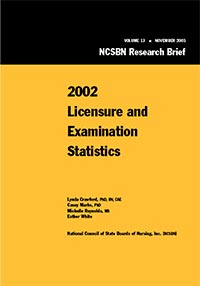
2002 Nurse Licensee Volume and NCLEX Examination Statistics (Vol. 13)
This annual publication provides national and state summary data of Member Boards’ licensure activities, as well as data on candidate performance on the NCLEX-RN and NCLEX-PN examinations. (© 2003)
2003 | Publications
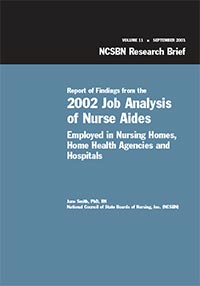
Report of Findings from the 2002 Job Analysis of Nurse Aides Employed in Nursing Homes, Home Health Agencies and Hospitals (Vol. 11)
This study evaluates the validity of the NNAAP blueprint. It provides information on the activities performed by nurse aides employed in nursing homes, home health care agencies and hospitals. (© 2003)
2003 | Exams Research
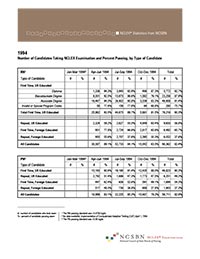
1994-2003 NCLEX Pass Rates
Summary data for multiple categories of candidates, U.S. and international, is provided for performance on NCSBN's two nurse licensure examinations, the NCLEX-PN and NCLEX-RN.
2003 | Publications
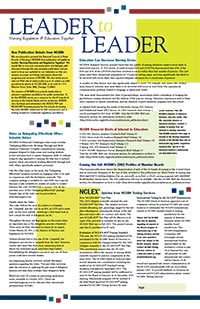
Fall 2003 Leader to Leader
- Read about the education initiatives at NCSBN
- Learn about errors and transition issues for entry-level nurses
- A summary of the 2002 NCSBN position paper on the education of advanced practice nurses is provided
2003 | Magazines
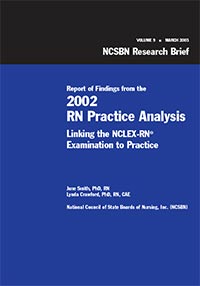
Report of Findings from the 2002 RN Practice Analysis Update (Vol. 9)
This practice analysis describes and compares the possible differences in the entry-level practices of newly licensed associate and baccalaureate degree nurses. (© 2004)
2003 | Exams Research
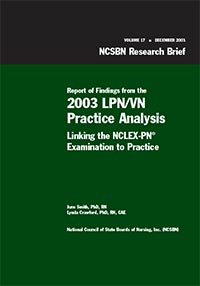
Report of Findings from the 2003 LPN/VN Practice Analysis: Linking the NCLEX-PN to Practice (Vol. 17)
This practice analysis describes and compares the practice characteristics and activities of newly licensed practical/vocational nurses (LPN/VNs). The empirical findings will be used to evaluate the 2005 NCLEX-PN Test Plan (© 2003).
2003 | Exams Research
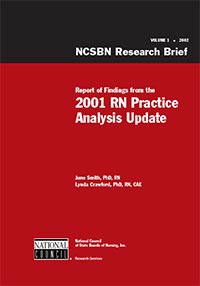
Report of Findings from the 2001 RN Practice Analysis Update (Vol. 1)
The purpose of this study is discovery of any potential differences between the entry-level practices of graduates of associate degree and baccalaureate degree RN educational programs (© 2002).
2002 | Research Item
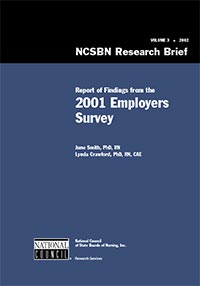
Report of Findings from the 2001 Employers Survey (Vol. 3)
Empiric evidence from the NCSBN RN practice analyses has demonstrated that associate degree and baccalaureate degree graduates are hired into the same types of positions and perform the same tasks within their first six months of practice; however, the employers of entry-level nurses have not been systematically surveyed about their actual hiring and employment practices. This survey addressed those practices and also asked employers to rate new RNs and LPNs on their preparation for various practice tasks.
2002 | Research Item

Report of Findings from the Practice and Professional Issues Survey (Vol. 2)
The purpose of this study is discovery of any potential differences between the entry-level practices of graduates of associate degree and baccalaureate degree RN educational programs (© 2002).
2002 | Research Item
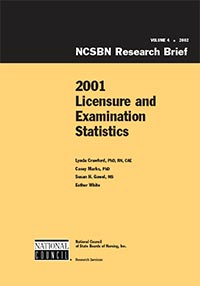
2001 Nurse Licensee Volume and NCLEX Examination Statistics (Vol. 4)
This annual publication provides national and state summary data of Member Boards’ licensure activities, as well as data on candidate performance on the NCLEX-RN and NCLEX-PN examinations. (© 2002)
2002 | Publications
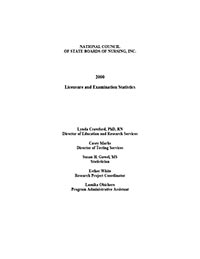
2000 NCLEX Exam Stats
This annual publication provides data of nurse licensure activities for NCSBN's member boards as well as NCLEX Examination statistics by country and state.
2000 | Publications
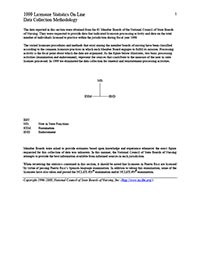
1999 NCLEX Exam Stats
This annual publication provides data of nurse licensure activities for NCSBN's member boards as well as NCLEX Examination statistics by country and state.
1999 | Publications
